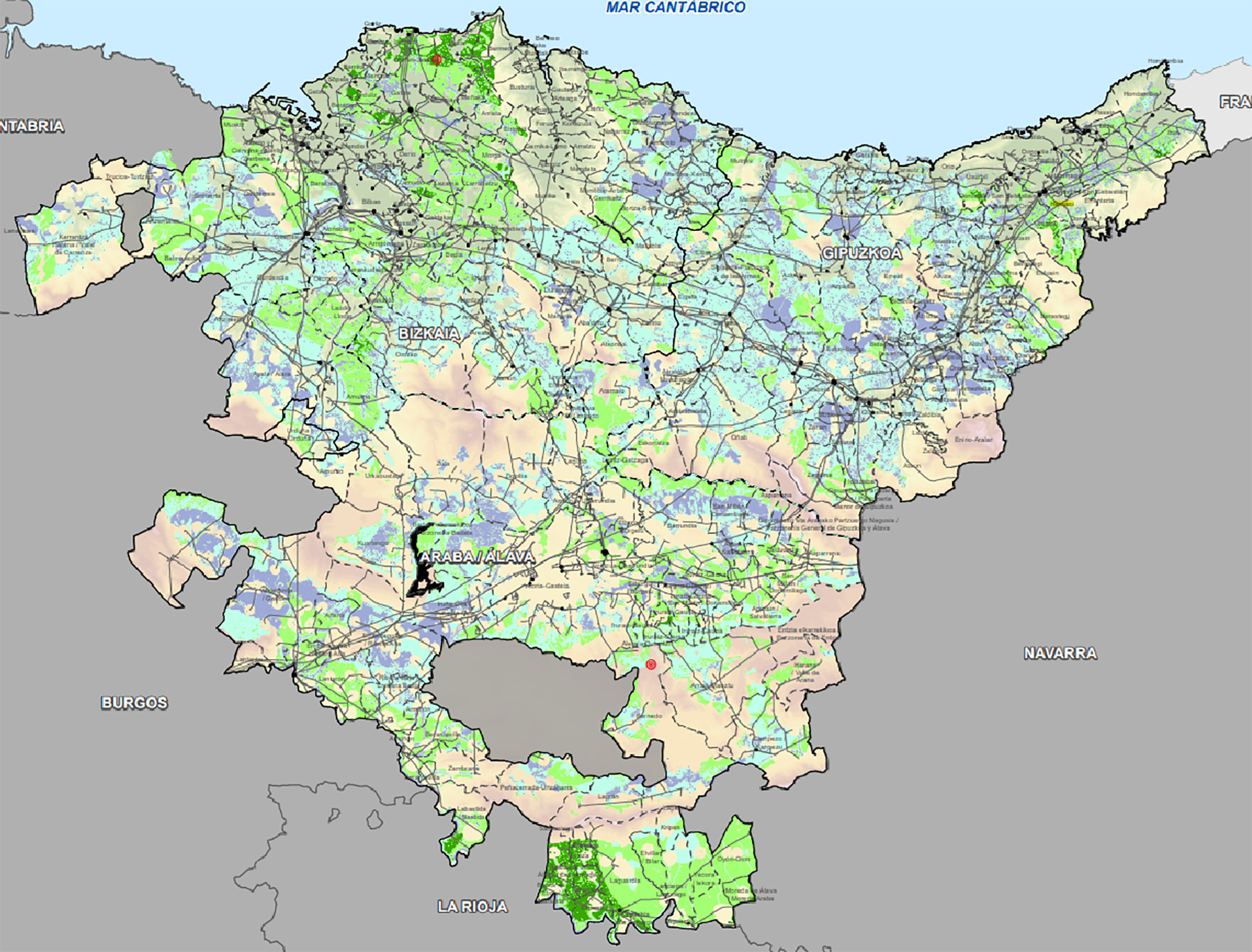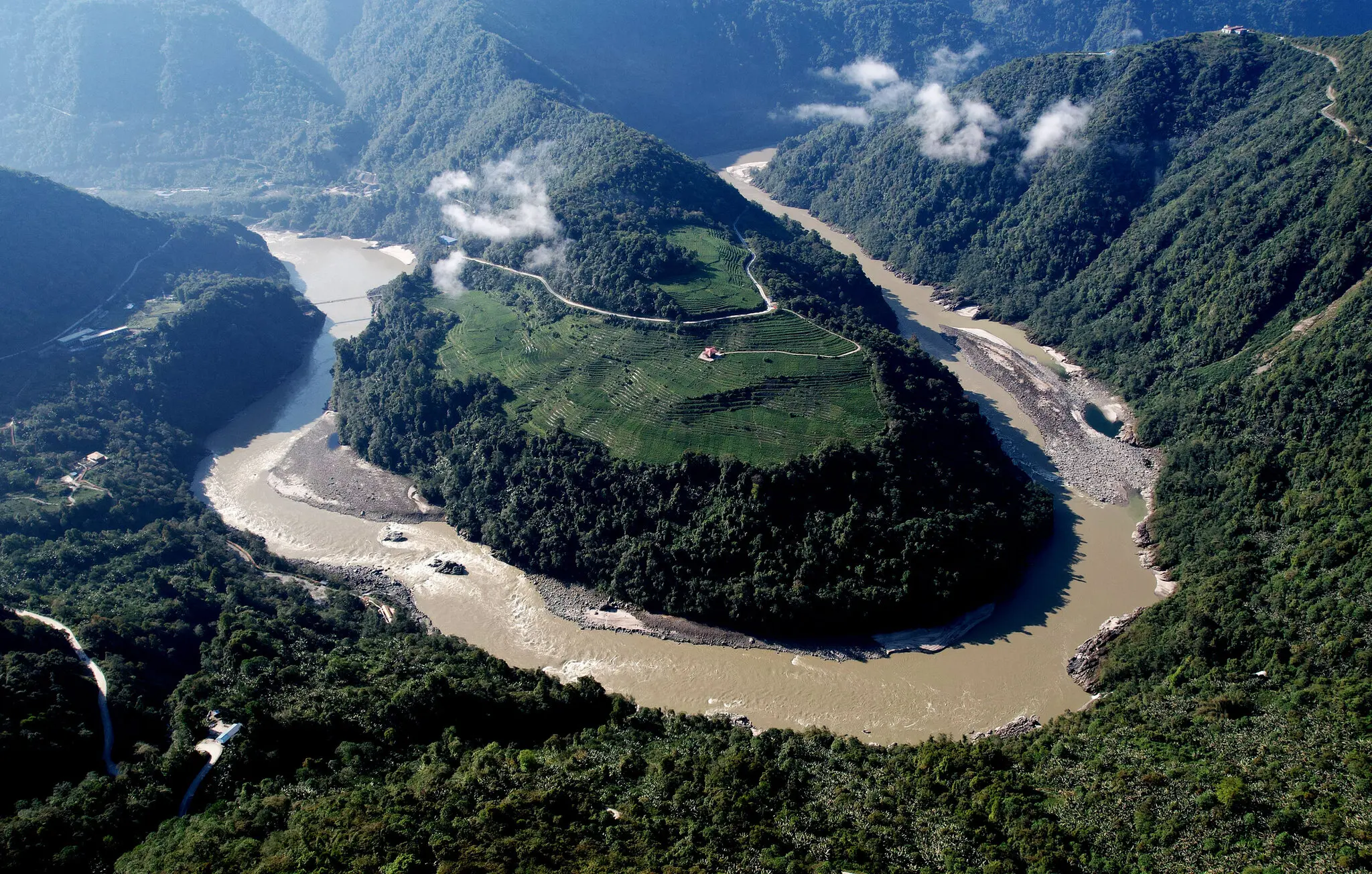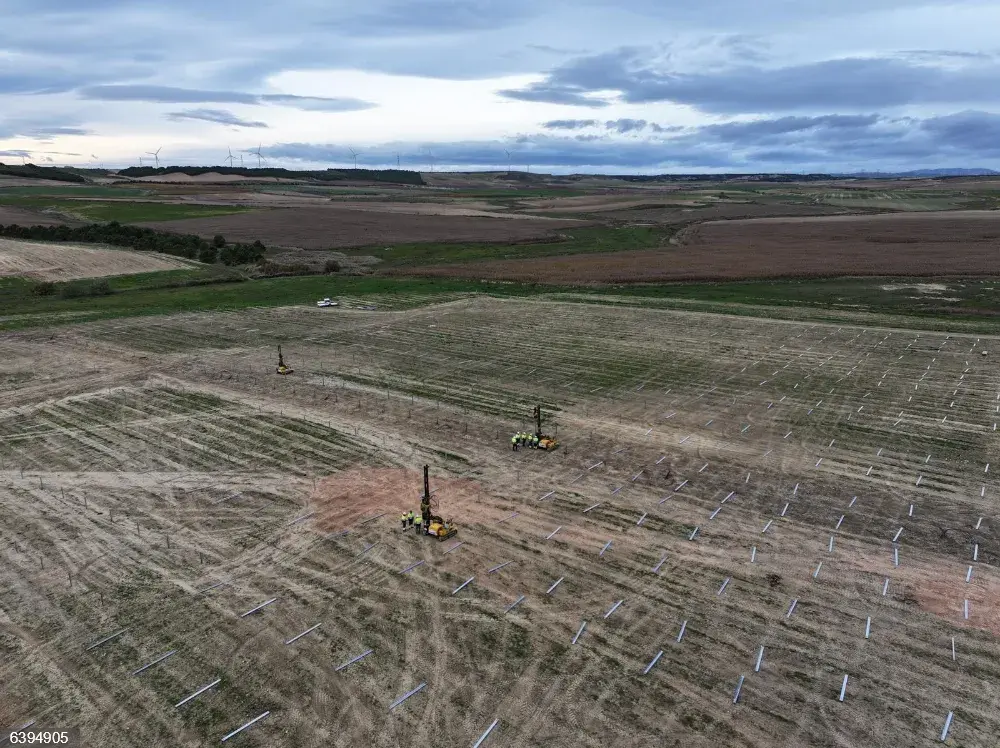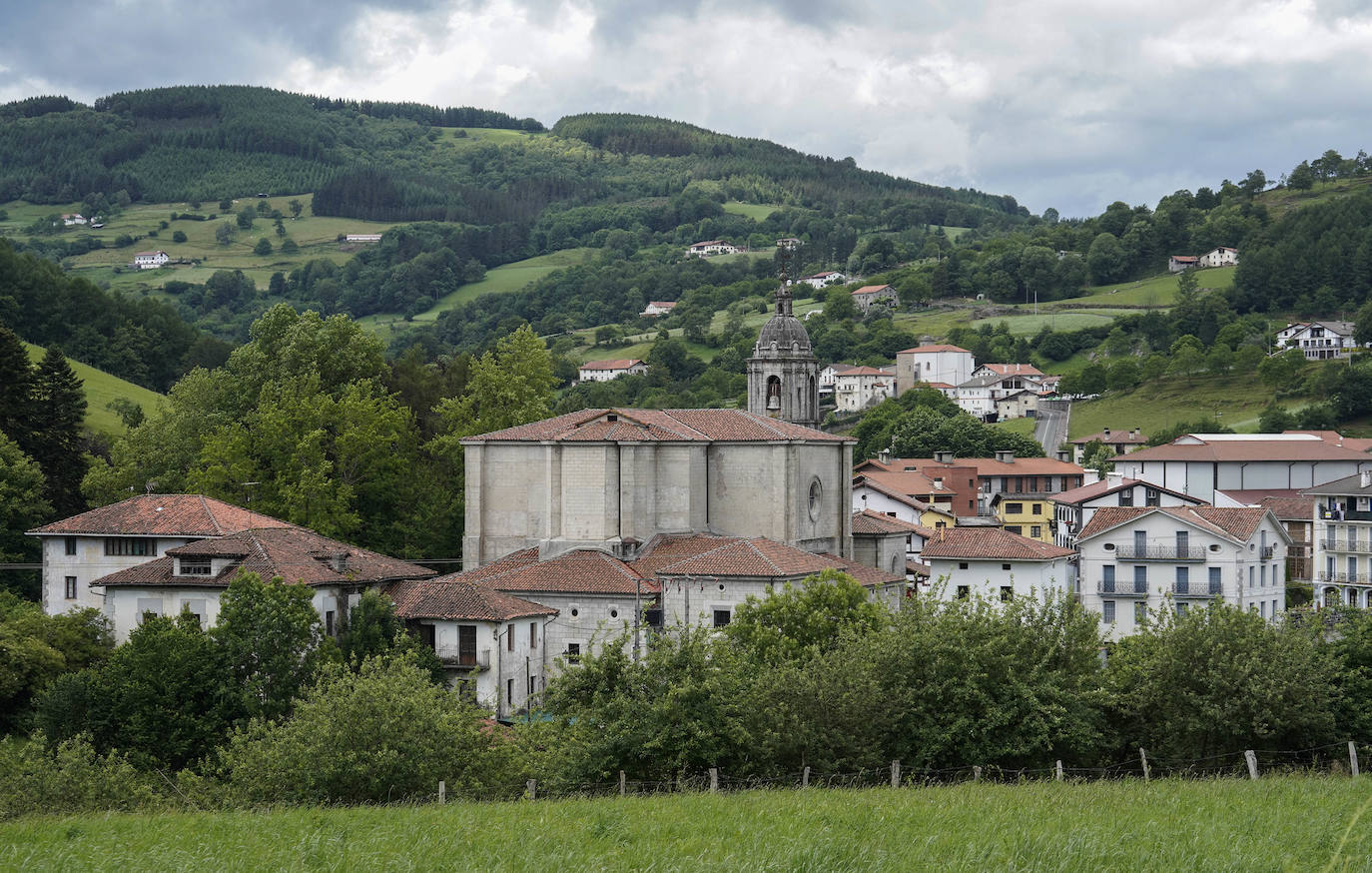“We’re in the Far West: the company that comes first takes the land and does what it wants.”
- The multinational Solaria intends to build a photovoltaic park of 100 hectares and a Very High Voltage Line that crosses the region in the Alto Nervión de Álava. Citizens have organised themselves against it and have carried out numerous mass activities in a short period of time. But Gorbeialdea's is just part of Solaria's global project in Álava. Meanwhile, a number of entrepreneurs eragilek.Horretaz have accused Unai Pascual, a neighbor of Zigoitia and a member of the Gorbeialdea Babes platform, of “cheating” or “chasing” and “pressuring” land owners when presenting their projects.

Solaria is driving the Zierbena Solar 3 project in Gorbeialdea (Álava). What kind of environment is Gorbeialdea and how would it affect the project?
It is a valuable natural area composed of three municipalities but a large number of small towns. Solaria’s project fully affects the three municipalities of Zigoitia, Zuia and Urkabustaiz. In the town of Gopegi, in the municipality of Zigoitia, it is intended to install a photovoltaic industrial polygon of more than 100 hectares. That's already public. But we know that in Zigoitia there will also be a second project of an additional 100 hectares, as in the last two years it is trying to buy land from the owners. And we also know that Solaria has over 30 projects planned in Álava.
As for the public project, it would be the largest strip of land between four villages, just 200 meters from the houses. 100 hectares, 100 extensions of football field in lands considered strategic for their wealth. On the other hand, it is located next to one of the main entrances of the Parque Natural de Gorbeia, which would have a great landscape impact and would also affect tourism linked to nature, a little important in the region.
They've also criticized the infrastructure they want to build for electricity transportation.
Yes. From the photovoltaic park there would be an electric line that would be connected to another line of Very High Voltage [more than 400 kilovots]. This line of Very High Voltage will be more than 100 kilometres long, and will extend from the south of Álava to Zierbena (Bizkaia).
The conditions would occur mainly on the Urkabustaiz and Zuia High Voltage lines. This is the construction of gigantic towers, about 70-100 meters apart from each other and about 100 meters high. The iconic Iberdrola building in Bilbao is between 100 and a few meters high. We would have to move large amounts of land to put the towers, make roads, leave a wide field to one side and the other of the line to avoid fires and other risks in the event of an accident... Many of its forests are not pine forests, but native forests, it is an important environment for fauna and especially birds, where they nest several protected species at European level ... The risk of biodiversity is high.
"They want to build giant towers, with a separation of 70 to 100 meters and a height of approximately 100 meters"
In Vitoria-Gasteiz you made your first public appearance against the project, on 21 June. They said they supported the energy transition and measures to avoid the climate emergency, but "respecting nature and the population". How does this materialize? There's a strong argument ...
In recent times it has begun to give a debate, but we see that it is not yet structured and that each actor does it separately: companies, governments, civil society, parties... Everyone has their reading, but as a society we are not discussing well.
There is no territorial planning. The sectoral plans for renewable energy remain unapproved, the wind is present but has become very obsolete. The Sectoral Territorial Plan is in the drafting phase, and with the criteria currently set out, the Zigoitia project would not obtain authorisation. But the Government has not approved the plan for a long time, and in the meantime it can do so. We have a governance problem. We're in a kind of Far West: the first company that comes in takes land and does what it wants. Solaria is the pioneer company in the Basque Country, a giant company, but they can also reach more. If we do not have a general plan and a social debate, this will be a disaster.
You claim a decentralized model and the proximity of energy production and consumption centres.
Of course, renewables have to be established, but with a little order. Consensus will be very difficult, but minimum standards will have to be achieved between the institutions and the social partners: what position, what size, who ownership is ... Our objective is an eco-social transition that goes beyond the energy transition. The energy transition cannot go against the eco-social transition, and Solaria’s project would.
The situation is that the company Forestalia is producing in Aragon a large amount of electricity to transport it to Vitoria-Gasteiz via a Very High Voltage line of hundreds of kilometers. And the plan is to move the electricity that would be produced in Álava to Zierbena, on the coast of Bizkaia. It has neither feet nor heads, as both the citizens and the institutions say.
"Solaria is a mafious strategy of the company"
You mentioned the Far West earlier. Solaria is a giant company with the largest investment fund in the world of Black Rock. The agricultural union UAGA has denounced the "harassment", the "blackmail" and the "pressure" that the company suffers in the Alavesa region of Arrazua-Ubarrundia, while you have also denounced in Gorbeialdea. The Lurra Network has also denounced that the company is "disappointing", among other things, so that the Basque Government and not the Spanish Government can authorise the fragmentation of projects.
Solaria is a mafious strategy of the company. We know that it has about 30 planned projects, although so far it has submitted three or four. All these projects should be analysed together when carrying out the environmental impact assessment, not in a fractional manner. Of course, the results of the conclusions are very different if they are carried out in full or in fractional fashion. These 30 projects would transfer the energy they produce to the same line and transfer it to Zierbena. They're a single giant project.
On the one hand, if it were presented as a single macro-project, the social response it would generate would be much greater, it is intended to fragment the resistance by dividing the project. On the other hand, it is estimated that each project would reach a power of 49,895MW. Over 50MW is decided by Madrid, not Vitoria, and they want to avoid that too. This also shows that the Basque Government grants more permits than the Spanish Government. This is a common practice, which has also been practiced in other places in Spain, where male violence is mild.
"The feeling is that Solaria is not going to get it, that they are not going to pass over our lands."
And the “persecution” of landowners, has it happened or is it happening in Gorbeialdea?
Solaria has pursued all landowners, one by one, very intensely and without stress, in order to hire or sell for 35 years. Many land owners were unaware of the size of the project. For example, in the case of Zigoitia, they were just told: "We'd like to rent a couple of acres to put some plates ..." But without saying that the project is 100 hectares. If you know, some who might be willing to sell wouldn't sell it. Or if they don't do any treatment and the others do, maybe later they'll be expropriated from the land. They use many similar mafia practices.
At their first mass appearance in June, 5,540 appeals against the Solaria project were filed in the Basque Government in July... it seems that there is a great deal of opposition and it is organised, is it?
In the three municipalities that we started organizing the project from the moment we met it, each has its own platform [Urkabustaiz Babes, Zuia Bidean and Zigoitia Bai], but we have created Gorbeialdea Aldeko Babes to work in a coordinated way. Popular platforms are very broad. In Zigoitia we held an open assembly every Friday, at first we met some 200 people, now it has come down but we got together more than a hundred. We have set up specialised working groups to work in the environmental and health field, we will present sound technical resources. The citizens have also made personal use of thousands of people. We are also pushing for the creation of energy communities.
People are very hot, but at the same time they are doing things with a lot of minds and a lot of willingness to work. It's been two very intense months, but this is going on for a long time, so the organization, the organization and the organization. The feeling is that Solaria won't get it, that they won't get past our lands.
"(The purpose of the Oion Plenary) is clear, to legitimize by law the energy megaprojects with significant irregularities in the processing"
Last Wednesday we had a hard and unpleasant day, not only for Labraza, but also for all the towns where we are threatened by a wind,... [+]













.png)



